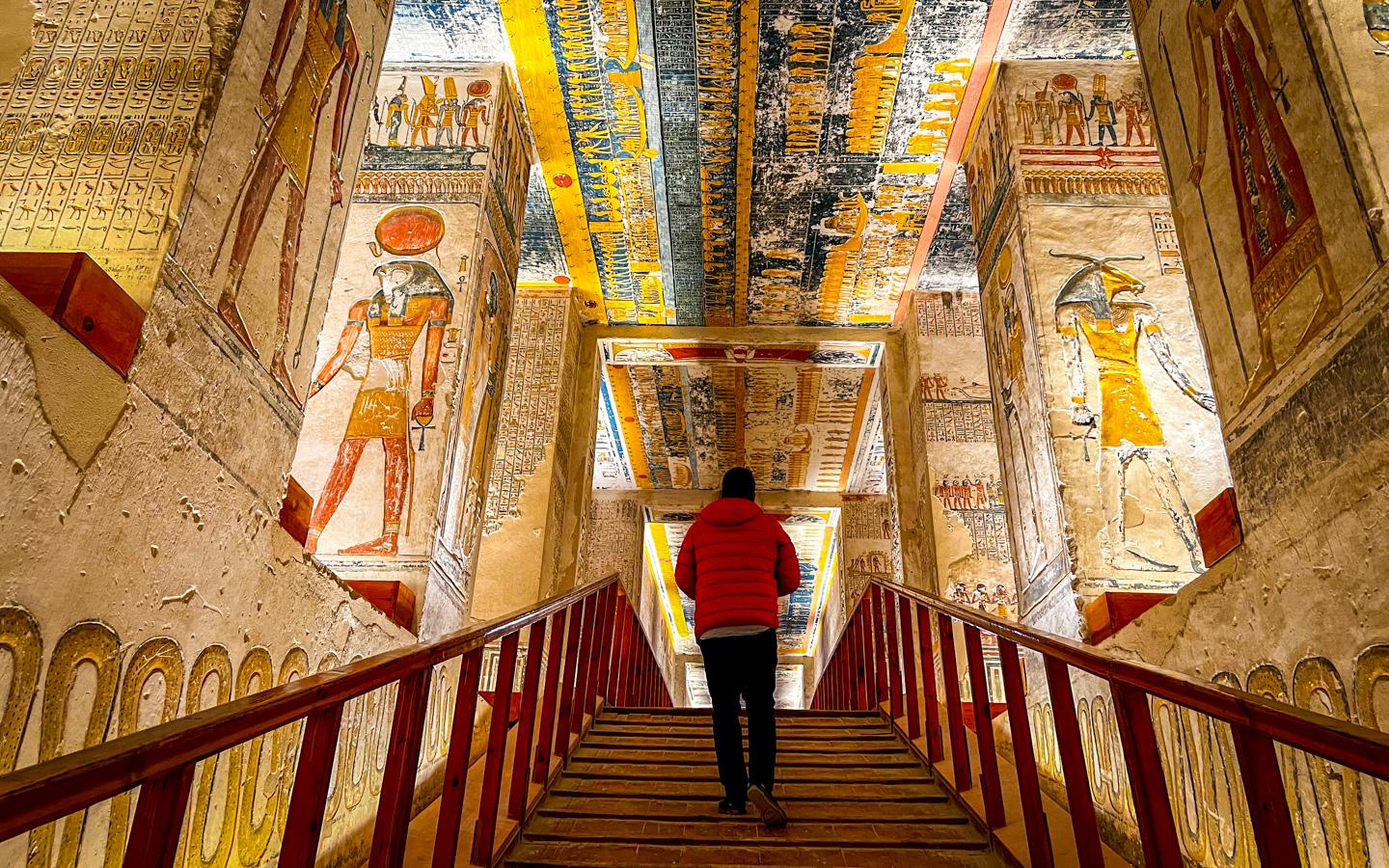Egypt is a mega ancient country that is rich in not only history but also culture and natural beauty. We think that everyone should visit this country at least once in their lifetime. We absolutely loved it and think that you will too. However, it is not a country you should travel to without any knowledge of its people, customs, and travel industry. You might end up disliking it if you’re not sufficiently prepared!
We have compiled 21 must-knows when planning a trip to Egypt so you can make the most of your time there.
OFFICIAL NAME: Arab Republic of Egypt
CAPITAL: Cairo
POPULATION: 10.23 crore
OFFICIAL LANGUAGE: Arabic
RELIGION: 90% Islam, 9.3 % Christian
1. Entry requirements for egypt (As of January 2022)
Being a county highly dependent on tourism, Egypt has relaxed its rules for travel. You’ll need the following documents to enter Egypt:
- A negative RT-PCR test despite vaccinations (see Covid Rules Section below)
- A visa/e-visa if travelling from India (see visa section below) or a visa on arrival for countries mentioned in this list.
2. Egypt VISA Requirements
Most countries are required to obtain e-Visa to enter Egypt while some can get a visa on arrival. A tourist visa is valid for 90 days and one’s trip cannot extend beyond 30 days.
To get an Egypt visa for Indians, things are a bit more complex and we struggled to understand this at first.
1. Offline Visa: Indian passport holders do not have an e-Visa as an option unless one is travelling with a tour company. So you must apply for your visas offline. The application along with a set of documents must be submitted to the consulate or the embassy which are only available in Mumbai and Delhi. If you cannot go to submit the documents, an agent or a relative with an authorization letter can go on your behalf to do so.
The processing time takes 2 to 3 working days. You can go to collect the visa from the Egyptian embassy in Delhi or the consulate in Mumbai during the specified timings.
This Egypt visa application process does not involve going for a personal interview unless one has no travel history or the immigration office insists on an interview.
The list of documents needed for the Egypt visa application is usually as follows: visa application form, a passport with 6 months validity and 2 blank pages for the visa stamps, recent photographs as per specifications, request letter to the consulate, confirmed flight and accommodation bookings, travel itinerary, and photocopies of the first and last page of the passport. One must also provide the previous 6 months’ bank details with a minimum balance of Rs. 50,000.
See the list of documents here
2. e-Visa: e-Visa is only given if you have a Host Letter from an Egyptian travel company. Due to our circumstances at the time, we were unable to arrange for all the documents timely and hence opted for the e-visa process. Lykke Travel (our tour operator) helped us with this process. It cost us $25 per person.
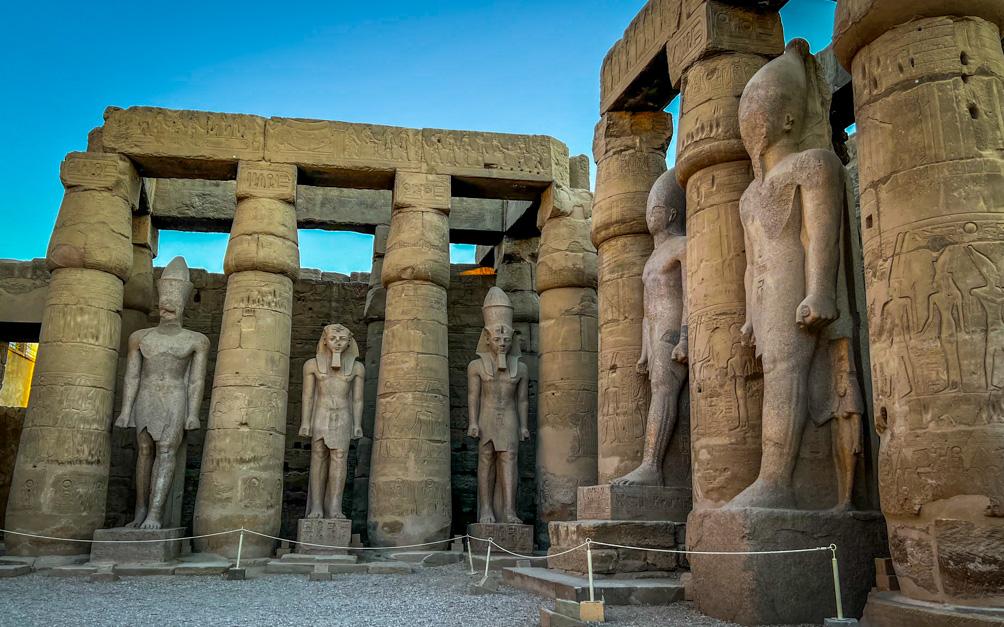
3. COVID Safety and Rules
Tourist spots, restaurants, hotels are all open in Egypt. Here are the entry rules:
1. All arrivals into Egypt, including its citizens, must provide a negative PCR test taken within 72 hours of departure. This extends to 96 hours for individuals arriving from Australia, Japan, China, New Zealand, South America, North America, South Korea, and Thailand and transiting through London Heathrow, Frankfurt, Rome, and Paris.
2. Alternatively, travellers arriving in the coastal governorates of the Red Sea (Hurghada and Marsa Alam), Marsa Matrouh, and South Sinai (Sharm El Sheikh) have the option of being tested upon arrival (for a fee of USD 30) and may then isolate while awaiting the results. Those who test positive for COVID-19 will undergo a 10-day quarantine period at a hotel. (All these locations mentioned in this point are beach locations so people arrive there from Europe/Russia directly and hence this point. If you’re an Indian you can disregard it)
3. All travellers must complete a personal monitoring card as well as show proof of health insurance upon arrival.
4. You’re required to quarantine for 10 days if tested positive on arrival
Note: You’ll find a lot of locals not wearing masks. I’m mentioning this so your expectations are set. If you go, you should at all times wear an N-95 mask (no cloth masks please) and sanitize your hands frequently, especially before eating.
4. best time to go to Egypt
The best time to go to Egypt is between October to April with September and April being the least crowded. December and January are peak tourists months so we’d suggest avoiding this time. We ourselves were there in December ( because we only get free time in December). It was pretty darn crowded at popular tourist sites and prices were soaring! Also, note that it is actually cold in Egypt during these months of December, January and you will need a jacket at least in Cairo and Luxor. Aswan only gets chilly in the evening but the wind in general in Egypt was so cold at the time.
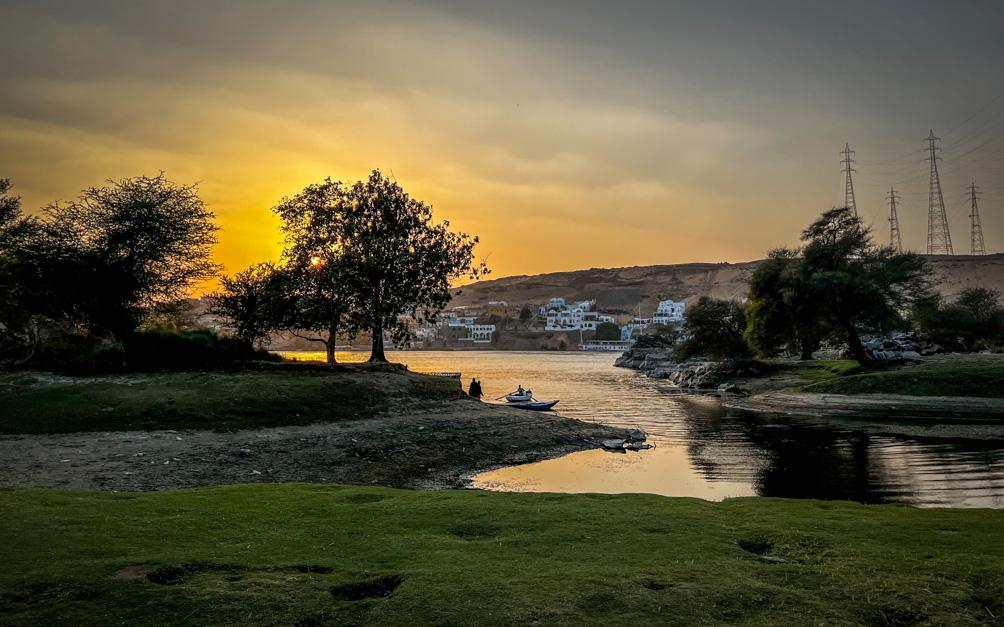
5. Best Places to visit in Egypt
Get familiarized with the names of Egyptian cities to understand other points mentioned below a bit better.
Yes, there is more to Egypt than just Cairo. The main or best places to visit in Egypt would be:
- Cairo: For Pyramids, Museums, Khan El Khalili Market, mosques in Islamic Cairo and churches in Coptic Cairo. You should know that it was the synagogues and churches in coptic Cairo that the Holy Family (Jesus, Mary and Joseph) hid while running away from the Roman Emperor. It was also supposedly where Moses was kept in a basket and floated on the Nile. If you’re of the Abrahamic religions or have a general interest in history like me, you’ll love it.
- Aswan: Aswan is one of the souternmost cities in Egypt. You will have to take a flight to get here from Cairo. Places to see here include the Aswan High Dam, Philae Temple, Unfinished Obelisk, Nubian Village, Felluca Ride on the Nile. However, the main reason why peopel visit Aswan is to see Abu Simbel – a magnificient ancient Egyptian temple near the border of Sudan.
- Luxor: Luxor is a city that no one should ever miss seeing. It is close to a significant amount of ancient temples and tombs and is just beautiful with such an old wolrd charm. Definitely our favourite in Egypt!
- Hurghada/Sharm El Sheikh/ Dahab: These places are perfect for diving and snorkelling in the Red Sea. The Red Sea is known to have some of the best diving spots in the world. You can also relax by the beach if being adventourous is not for you.
- White Desert/ Siwa Oasis: These are locations in the Western Desert region of Egypt. The White Desert has landscape like you never seen before and the Siwa Oasis is mainly known for it’s incredible blue pools and historical sites.
We skipped Alexandaria because it didn’t appeal to us in pictures and also because everyone we spoke to during our Egypt trip said that it isn’t worth visiting. However, you can Google to know if Alexandaria is for you.

6. How many days to spend in Egypt + Brief itinerary
This is a tough one to determine. It really depends on your interests and how many days you have on hand. I would say spend a minimum of 7 days in Egypt. 10 days is ideal since you get to see a bit of everything. We had personally planned to do Itinerary No. 6 but then plans changed just a day before leaving for India and we ended up in Sharm El Sheikh following Itinerary No. 7. We are glad to not have missed diving and snorkelling in the Red Sea.
Here are some quick itinerary options along with the total number of days so you can decide which one is best for you. The number of days for each specific place is given in brackets.
- Quick Trip for Pyramids: 2 days
City: Cairo - Pyramids, Temples and Tombs: 5 days
Cities: Cairo (2) + Luxor (3): 5 days
Cairo to Luxor by flight - Heritage Trip: 6 days
Cities: Cairo (2) + Aswan and Abu Simbel (2)+ Luxor (2)
Cairo to Luxor by Flight, Aswan to Luxor by train - Complete Heritage Trip: 8 days
Cities: Cairo (2) + Luxor (3) + Luxor to Aswan by car (1)+ Aswan and Abu Simbel (2)
Note: The road route between Luxor to Aswan has 3 beautiful temples and hence takes one day. Alternately, you can do Aswan and Luxor via a Nile Cruise. - Heritage and Beach Fun: 8 days
Cities: Cairo (2) + Luxor (3) + Hurghada/Sharm El Sheikh/Dahab (3) - Heritage and Desert: 10 days
Cities: Cairo (2) + Luxor (2) + Luxor to Aswan (1) + Aswan (1) + Abu Simbel (1) + White Desert (2)
(one extra day if going to Siwa Oasis instead of the White Desert) - A Bit of Everything: 12 days
Cities: Cairo (2) + Luxor (2) + Luxor to Aswan (1)+ Aswan (1) + Abu Simbel (1) + White Desert (2) + Hurghada/Sharm El Sheikh/Dahab (3) - All The Highlights: 16 days
Cities: Cairo (2) + Luxor (3) + Luxor to Aswan (1)+ Aswan (1) + Abu Simbel (1) + White Desert and Siwa Oasis (5) + Hurghada/Sharm El Sheikh/Dahab (3)
Alternately, you could spend only 1 day or even 3 in Cairo , 4 days in Luxor (including a day for transport between Aswan and Luxor), 0 days exploring Aswan ( we think it can totally be skipped). There are so many permutations and combinations. Best to decide on your own what you would like to do.
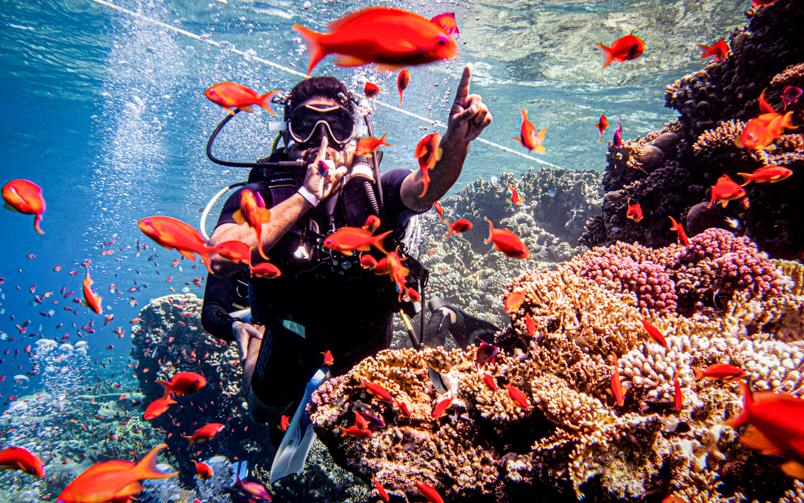
7. is egypt safe for travel?
Egypt is as safe as any other place. We never felt unsafe there at all. Everyone was very welcoming and friendly.
However, you will come across US/Canada government directives that state while it is safe to travel to Cairo, Luxor, Aswan, Hurghada, etc., one should travel to certain areas in Egypt with caution. These are mainly border regions of the Sinai Peninsula (with the exception of the resort town of Sharm El Sheikh) and the Western Desert. While we did not feel unsafe anywhere, it is your call to travel to these places or not. Most people we met along the way in Egypt, did travel to these places.
This is what we have to say:
- Border region of India also isn’t particularly without unrest. Don’t we still travel to Kashmir, Ladakh, Arunachal Pradesh, etc? As long as one sticks to the tourist routes, you should be okay.
- Terrorist activity can happen anywhere, including right here in India. There was a bomb blast in Mumbai, Delhi, and Pune. Don’t we often go to places where terrorist activities happened in the past without a care in the world?
Bad things can anywhere in the world at any time.
8. How to get around Egypt
The most popular and easy way to get around is via flight followed by a cruise, private tour car, bus, and train.
- Flight: Flights are typically taken for these routes: Cairo-Aswan, Cairo-Luxor, Cairo/Luxor/Aswan-Sharm El-Sheikh, Cairo/Aswan-Hurghada
- Cruise: Cruises run for 3-4 nights are typically taken between Aswan-Luxor. You have the option of a big cruise boat, small dahabiya boats, or even the adventurous feluccas though most people opt for the big cruise boats. You could also take a cruise in Lake Nasser to see Abu Simbel.
- Private Car: A popular option for travelling between Aswan and Luxor and also adopted for Aswan-Abu Simbel.
- Bus: Buses are cheap and hence an amazing budget option for travelling around Egypt. These are usually be taken for Cairo-Luxor, Cairo-Sharm El Sheikh, Luxor-Hurghada
- Train: The train is a popular mode of travel for getting to Aswan from Cairo. However, they’re known to be late nearly always, like here in India as well. Another issue is that tourists are not apparently allowed on the day trains because it is apparently unsafe for them. Hence, it is said that you can only take the night train. However, I believe you can always go there and buy your ticket or discuss it with your tour operator.
The sleeper night train costs USD 80 (Rs. 6,000) so you’ll have to stick to the chair car which is about $10 (Rs. 800) but will be very uncomfortable for a long journey.
Within the cities, you can get around by Taxi. Cairo has Uber so that’s great because you won’t have to haggle or look for taxis. Aswan and Luxor both have taxis and horse-drawn carriages/rickshaws. Buses within the city are like minivans. They’re congested and pretty unsafe going by what our guide told us and the accidents we saw ourselves.
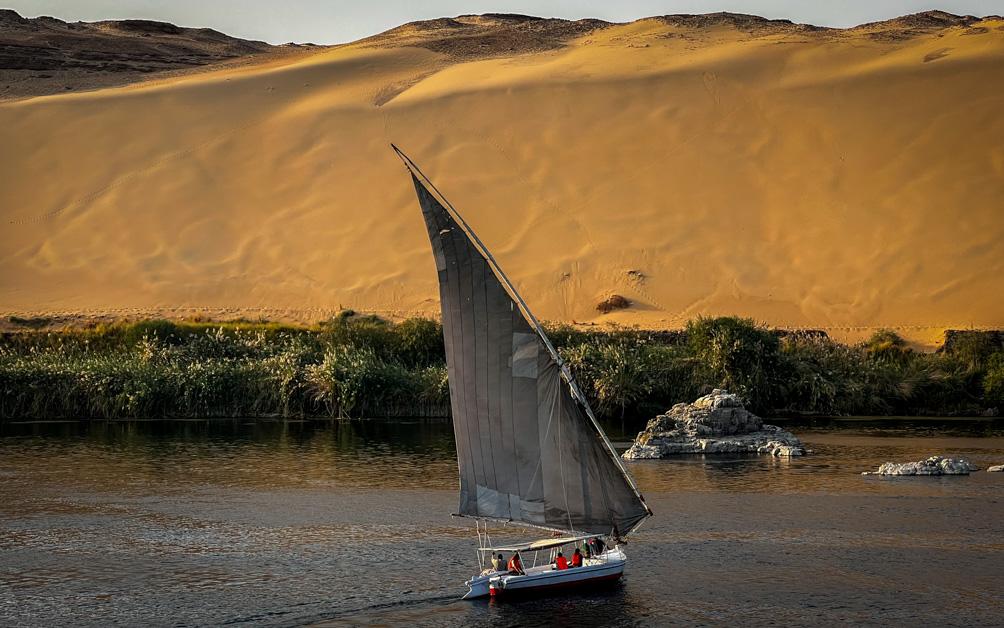
9. You’ll need to hire Egyptologist guides
To make any head or tail of the sites in Egypt, you have to avail the services of an Egyptologist Guide. Egyptologists are basically archaeologists, historians, linguists, or art historians who specialize in Egyptology, the scientific study of Ancient Egypt and its antiquities. They can read hieroglyphics and explain what’s written on the walls of the temples and tombs. They’ll tell you ancient Egyptian lores and the whos, whys, and hows. They’re essential in giving you an insight into Egypt and are the only ones who can answer all your questions in detail. And trust me, you’ll have many 🙂
10. To cruise or not to cruise in EGypt
A very popular way to explore Egypt is via a cruise between Aswan and Luxor. These cruises are typically 3 or 4 nights depending on if you’re travelling from Aswan to Luxor or the other way round. The large cruiser boats carry 50-100 passengers and with onboard amenities including a sundeck complete with a pool and restaurant. They have a set regimented itinerary usually including temples at Edfu and Kombo, Philae Temple, and West Bank sites like Temple of Queen Hatshepsut, Valley of Kings, and Karnak Temple. Some cruises have the option to add in Hot Air Baloon Ride and a trip to Abu Simbel. They may also give you the option of private tours at sites.
Advantages of a multi-day Nile Cruise:
- Relaxed travel from Aswan-Luxor while watching life along the Nile
- Everything is included from stay, food to tours so it’s an all inclusive package and you don’t need to worry about anything else
- Depending on the cruise you choose, your trip might turn out to be cheaper compared to a private on-road trip.
Disadvantages of a multi-day Nile Cruise:
- You visit tourist sites in large excursion groups.
- You have a regimented itinerary and can only spend an allotted time at each tourist site
- You do not have freedom to travel wherever you want whenever you want
- You actually save one day and can see more sites if not going on a cruise
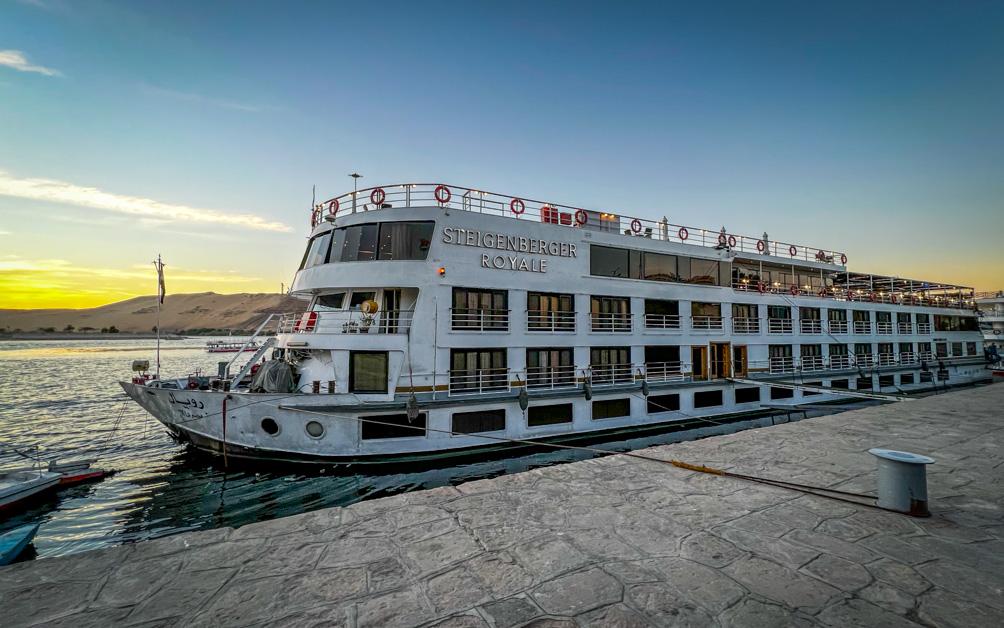
Some points for a Nile Cruise:
- Since most people like to opt for the Nile cruise, it is highly recommended that you book this in advance. There are cruises to fit every budget, so pick one that you like and book it before you get to Egypt.
- Cruises do not run from Cairo.
- Most of the cruises will be 3 nights 4 days from Aswan to Luxor or Vice Versa or 6 nights and 7 days which will be Aswan to Luxor and back again.
- Nile cruises leave only on specific days of the week. If you intend to do a Nile Cruise in Egypt, it should be the first thing you book and you should build your itinerary around the dates for the cruise. Mostly cruises run on Mondays and Wednesdays and some on Fridays.
11. Independent Trip vs Organised Tour
We are major advocators of independent trips meaning we don’t go via any particular travel company. We book everything ourselves and figure out our own way in a new country/city. However, on most blogs we read, people on independent trips to Egypt had some or the other incident or a series of them. While these incidents are part and parcel of travel, we wanted to have a good laid-back trip and not go through them.
Here is why we think that doing an organized tour in Egypt is best.
- Drivers do not speak English.
- You will not have to haggle day in and day out and be worried about being ripped off.
- You’ll need a good licensed Egyptologist guide to show you around the monuments and explain the rich Egytian history.
- Egypt is a country with lots to see in each location and you simply cannot see most locations without a guide. You’ll waste time arranging for transport and guides.
- Seperate day tours booked online can get very expensive. Trust me, I did the math.
- Hotel travel desk charges are high
- Without a guide by you, you’ll get approched and hassled by extremely persistent touts.
- If you have an Indian passport, you cannot get an e-visa unless you’re travelling with an Egyptian travel company. The process for applying for an offline visa is very tedious. We thought of getting one ourselves and then decided not to seeing the amount of documents needed.

I know all this because we considered independent travel in Egypt. However, for Egypt, we came to the conclusion that we’d rather pay for the convenience of an organized tour. Since group tours don’t suit our travel style we decided to do a private tour. We spent 20 days sending emails back and forth with two Egyptian travel companies and they were so very expensive.
We finally found Lykke Travel (an India-based company) through an Instagram follower and booked them because they were not only very competitively priced but also because Shashank (the owner) was super helpful. He knew the ins and outs of travelling in Egypt being a former backpacker himself. Lykke has a stake in the Egyptian travel company so it’s pretty much like going with a local company itself. The perk is that you’ll have an Indian touchpoint who understands his clientele well. If you want to book a trip to Egypt or elsewhere through them, you can call Shashank at +91 9309792531 and give him our coupon code ” TWMLYK ” for a 5% discount or if booking through their website add the code TWMLYK in the coupon code section.
That said, if you are an independent traveller, don’t let us stop you. Several people do it and so can you.
12. Currency used in Egypt
The currency used in Egypt is the Egyptian Pound.
1 EGP = 0.064 USD | Check current rate
1 EGP = 4.78 INR | Check current rate
If you’re travelling from India, do not carry Egyptian Pounds but instead, carry USD notes. You can get the USD notes exchanged for EGP notes in Egypt. This is the best course of action to save money on currency exchange costs.
We got USD changed twice in Egypt and paid most hotels with a credit card itself.
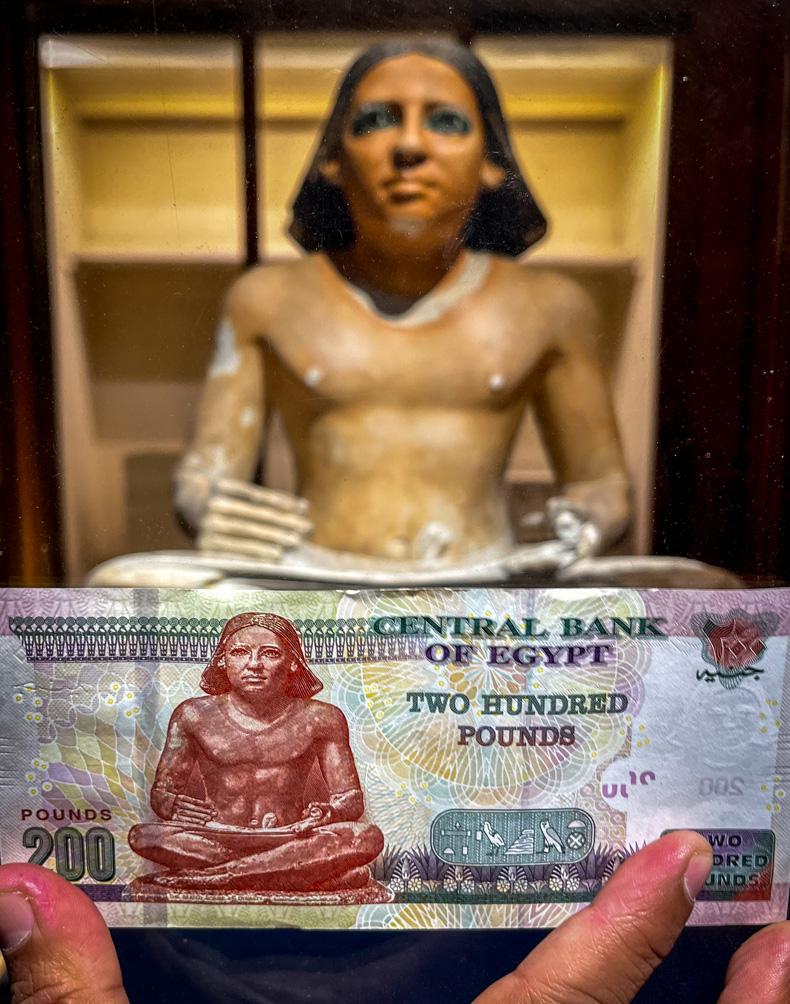
13. Egypt trip budget
Egypt is known to be an inexpensive country but honestly, an Egypt trip isn’t as inexpensive as you’d expect. We spent Rs. 2,90,000 or EGP 62,000 on a 15-day trip without international flights. However, we got some monetary benefit because we used loyalty points to book hotels so this might not be the same for you.
Per our calculation, a trip to Egypt would cost about Rs. 9,050 or EGP 1,810 per day without the cost of international flights, domestic flights, and some other fixed expenditures like COVID test, Visa, Sim Card, etc. We have provided a detailed budget and break-up of the cost in this article – How much does a trip to Egypt cost?
I must specify that we travelled in the peak month of December so these costs will be cheaper if you travel in other months.
14. Tipping culture
Egypt has a tipping culture so you will have to tip anyone and everyone offering you services. Yes, you’ll be expected to tip anyone offering to click a picture, show you directions, give you a snippet of information, etc. Either take the information and pay up or do everything to avoid such instances.
So, you should always have small change on you or you can be stuck in tough and embarrassing situations where you don’t know how to pay a person and hence end up paying more or even less.
Typically this is what you pay:
| Toilet Use | EGP 5 per use |
| Tour Driver | EGP 60 per day |
| Tour Guide | EGP 70 per day |
| Waiter | 20% of the bill amount |
| Short Duration Services: Porter, Cab Driver | EGP 20-30 |
| Anyone offering help: | EGP 10-20 |
15. Learn to haggle
Haggling isn’t for everyone. Some people (like me) don’t feel comfortable doing it. But, it is highly recommended in Egypt because you are nearly always charged an excessive premium being a tourist.
This is because Egypt has had a decline in tourism in the last ten years. Now it’s even worse due to COVID-19. So, business is suffering, basic commodity prices have risen and hence, money is tight.
But, you also don’t want to be paying an excessive amount when a local would pay a fraction of that cost!
The thumb rule is to start haggling at 25% of the amount quoted to you and settle at the 30-40% range. We did haggle but not as much (because locals are genuinely suffering) and paid about 50-70% of what was quoted.
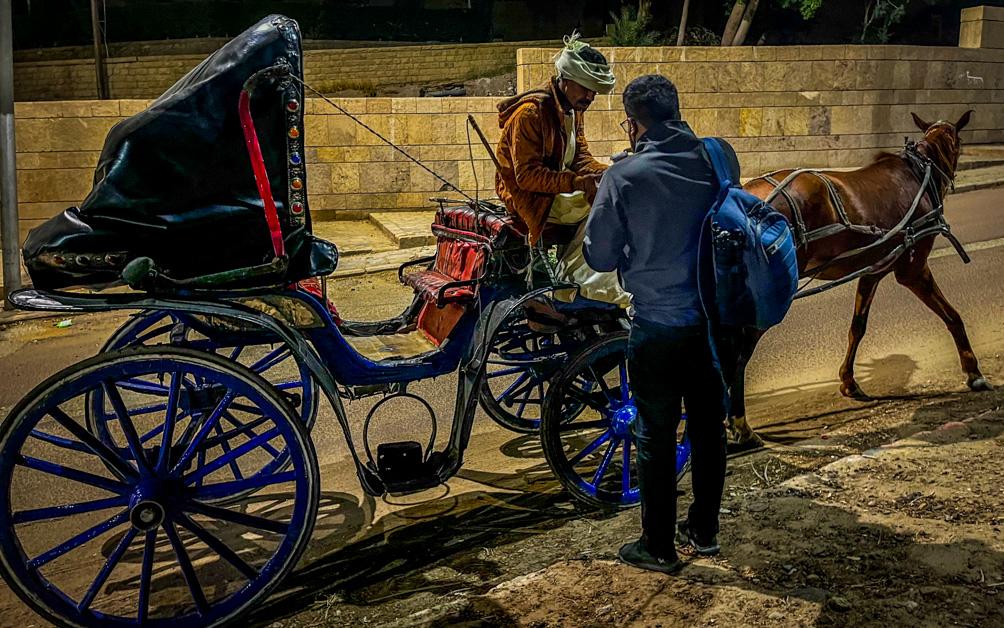
16. beware of Scams
Egypt does have its share of scams and hustle behaviour that can be quite annoying. Try to keep your cool and be polite though you’ve got to know how to deal with them overall. Here are some tips to avoid being scammed in Egypt.
- Say ‘No’ confidently: The moment you land in Egypt, you’ll be pestered to hail a taxi, steered to tourist shops and travel agencies, etc. They’ll try to grab your attention with ‘Remember me?’ and for Indians “Shahrukh Khan, Katrina Kaif, Kareena Kapoor’. When people approach you just say ‘La Shukran’. Do not have eye contact and keep walking. If you’re indecisive or don’t tell them a firm no, they will keep following you. This will happen a lot so it is essential you learn to avoid such people.
- Agree on a price beforehand: If you are availing any services from anyone, including hiring taxis, agree on a price before you avail it. And do not pay any more money even if the person requests it after the service is done. A few times we were asked for more money after agreeing on a price (Sir some money for the horse, for the camel, etc.) but we simply refused and walked away.
- Agree to a price in Egyptian Pound: When agreeing to a price, ensure it is the Egyptian Pound you’re referring to and not just Pounds. If anyone mentions just the word ‘pounds’ they may be implying British Pounds and you’ll be ripped off. This did not happen to us but it happens to a lot of people so keep this in mind.
- Buy souvenirs with care:
1. If you’re looking for special Egyptian items such as Alabaster showpieces, painted Papyrus, Gold, Cotton etc. you’ll need to buy them from specialized reputable shops because the ones in random souks may be fake.
2. Note that your guide will take you to stores during your trip because he/she gets a commission at these stores for the purchases you make. Know that items in these stores will be a bit heavily priced and are generally referred to as tourist traps. You can go through the items, enquire about the price and choose to not buy. However, we did buy from such a store despite knowing all this and loving our purchases.
3. Shop around to see the going price of a product before you purchase.
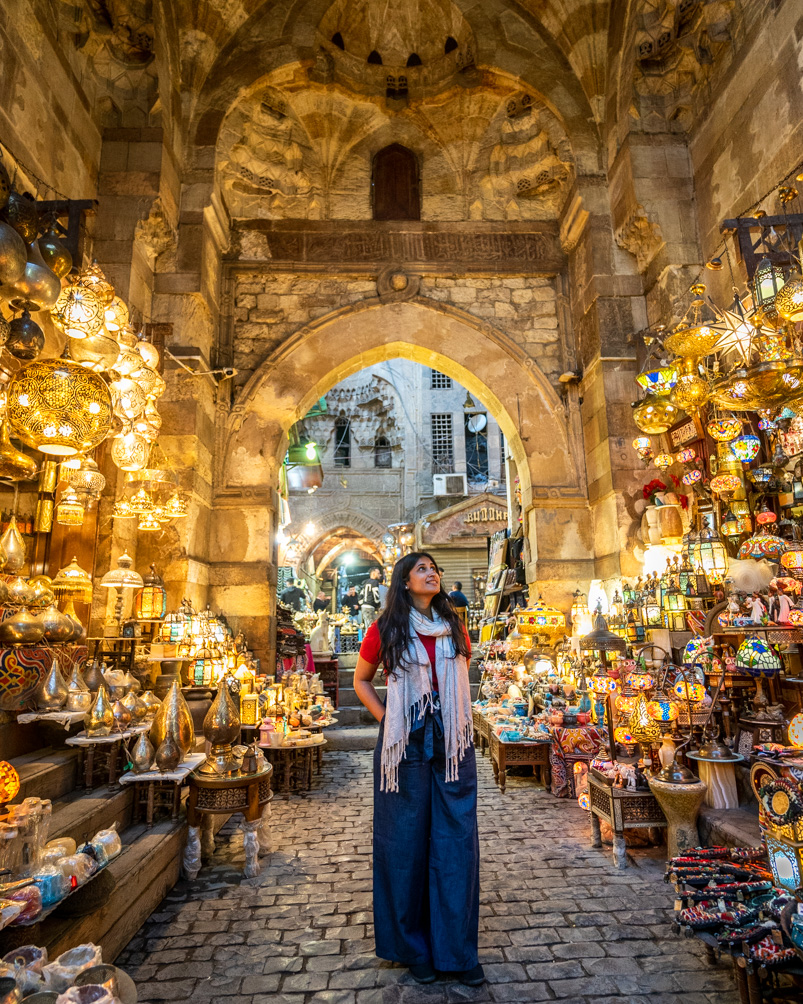
- Keep the Uber app downloaded: Private taxi drivers can be a nightmare and will always try to oversell. So, use an Uber in Cairo to avoid price unnessesacry price negotiations. It is the only city where Uber is available unfortunately so you’ll not have this option elsewhere. Ensure you’re checking the route on your Google Maps even in an Uber. Drivers everywhere, not just in Egypt, have a tendency to drive you around to hike up the price.
- Know where you have to go: If not travelling with a tour, make sure you know which entrance etc. you are to enter from. You’ll be misguided by camel owners and other people if you don’t.
- Call out the cash note amount when paying: Some drivers lie about the amount you paid to them saying you gave an EGP 10 bill when you give an EGP 100 bill. So, when you pay for something, call out the number on each bill show it to the driver, and have him agree with you that the amount is correct as you hand it to him. Then he will not be able to suddenly say that one of the bills was less than you thought.
- Help is offered for tips: If anyone offers you any help in and around tourist sights, follow step 1. Help is usually offered in exchange for tips or baksheesh as they call it.
- Keep change: Always have change on you. If you don’t have a change, you’ll end up paying or tipping more quite often. No one in Egypt ever has any change on them :/
Because we were so prepared for any scam, they either didn’t happen to us or we were ready to avoid them. Makes a huge difference in your level of enjoyment and fun when you’re prepared to not be ripped off!
And yes, please remember that you shouldn’t judge all Egyptians by the actions of some scam artists. Most Egyptians are honest people who really want you to have a good time in their country.
17. Foods to eat in Egypt
Egyptian cuisine has been influenced by many countries throughout history, so you will be able to taste many cultures on one plate. If you’re a meat lover, Egypt has so much in store for you. But don’t fret, they also have options for vegetarians. These are the foods we usually ate:
- Koshary (veg): A mix of rice, spaghetti/vermicelli, macaroni, fried onions, and black lentils, topped with thick tomato sauce, garlic and vinegar sauce, and chilli sauce. It sounds weird because it is a mix of Indian, Roman and Egyptian foods. But it is delicious and was our go-to dish in Egypt. Trust me, two people can eat one bowl – it is carb-rich and very filling.
- Egyptian Lentil Soup (veg): A simple soup made of red lentils that is delicately flavoured but beautifully balanced with an earthy, spicy flavour. You’re given some lemon to squeeze on top for a fresh tanginess. I had this whenever I wanted to have something light yet nutritious and filling. It was comfort food!
- Ta’meya or Egyptian Falafel (veg): The Egyptian Falafel is mainly prepared out of crushed fava beans mixed with other ingredients than fried. It is usually served with tahina (called tahini outside Egypt), baba ganoush (eggplant sauce), and salad (pickled carrots and radish) with Egyptian bread which are like small Pita pockets. We always ordered either this or a mezze platter if available as they mostly come with the same stuff. This meal is inexpensive, delicious and super filling! This is usually served with Ful Madames talked about later.
- Kebab & Kofta: Shish kebab or Seekh kebab is juicy chunks of seasoned beef/lamb/ veal cooked over coals on a skewer. While Kofta is minced meat mixed with spices and parsley, rolled into a finger-shape onto metal skewers before hitting the coals. Both of them are usually served with bread and an assortment of green salads and dips, mostly tahina and baba ghanoush.
- Shawarma Fatta: Fattah dish is made of a layer of small fried bread pieces mixed with garlic vinegar dipping sauce, covered with a layer of rice cooked with veal broth or lamb broth, which is topped with a spiced tomato sauce. Shawarma Fattah is basically Fattah topped with Shawarma which is basically shredded meat that has been cooked on vertical spits and grilled all day. It meat was crispy and juicy and the rice was so flavourful. Must try!
- Karkade (drink): Delicious Hibiscus Tea that can be served cold or not. Modi had the cold version with nearly every meal.
- Turkish Coffee (drink): When in Egypt, ditch regular coffee for Turkish Coffee. It is very strong and extremely yummy! I had this with every meal!
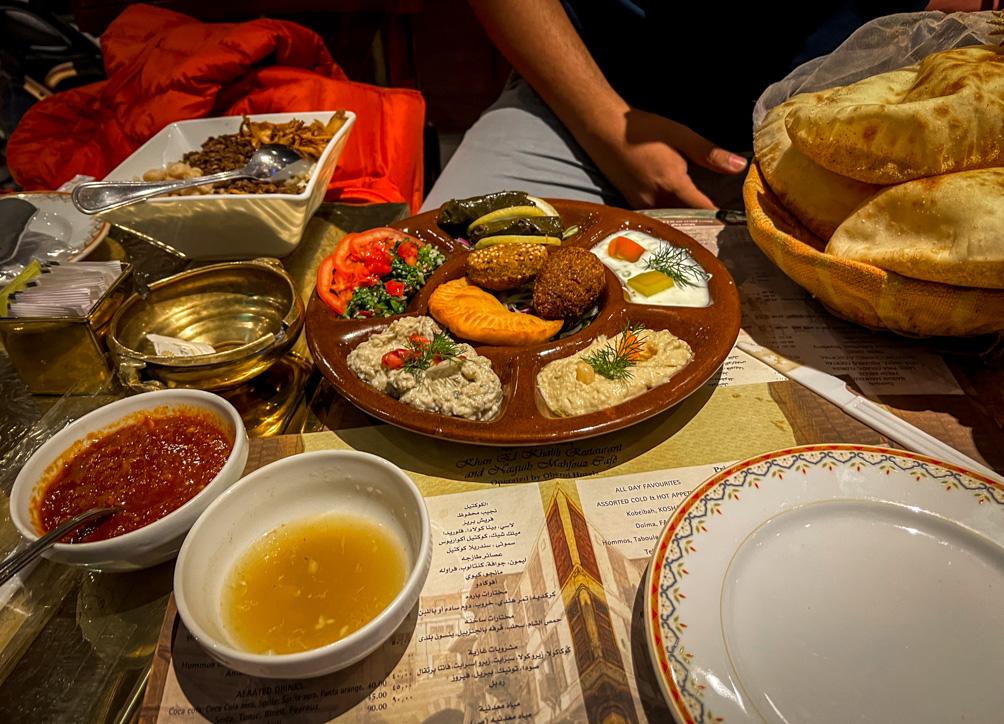
Two dishes we didn’t try but you might like to:
Ful Medames: Ful (pronounced Fool) consists of lava beans prepared with oil and lemon juice. You can also add garlic or onion if you prefer. It can be prepared in many different ways and people eat it with butter, spicy oil, olive oil, tomato sauce, pepper, pastrami, parsley, sausage, and boiled or fried eggs. It is believed that Ful was cooked all the way back in ancient Egypt.
Mulukhiya: A soupy dish of green leafy vegetables chopped and cooked with garlic in beef, rabbit, or chicken stew, and served with rice or bread.
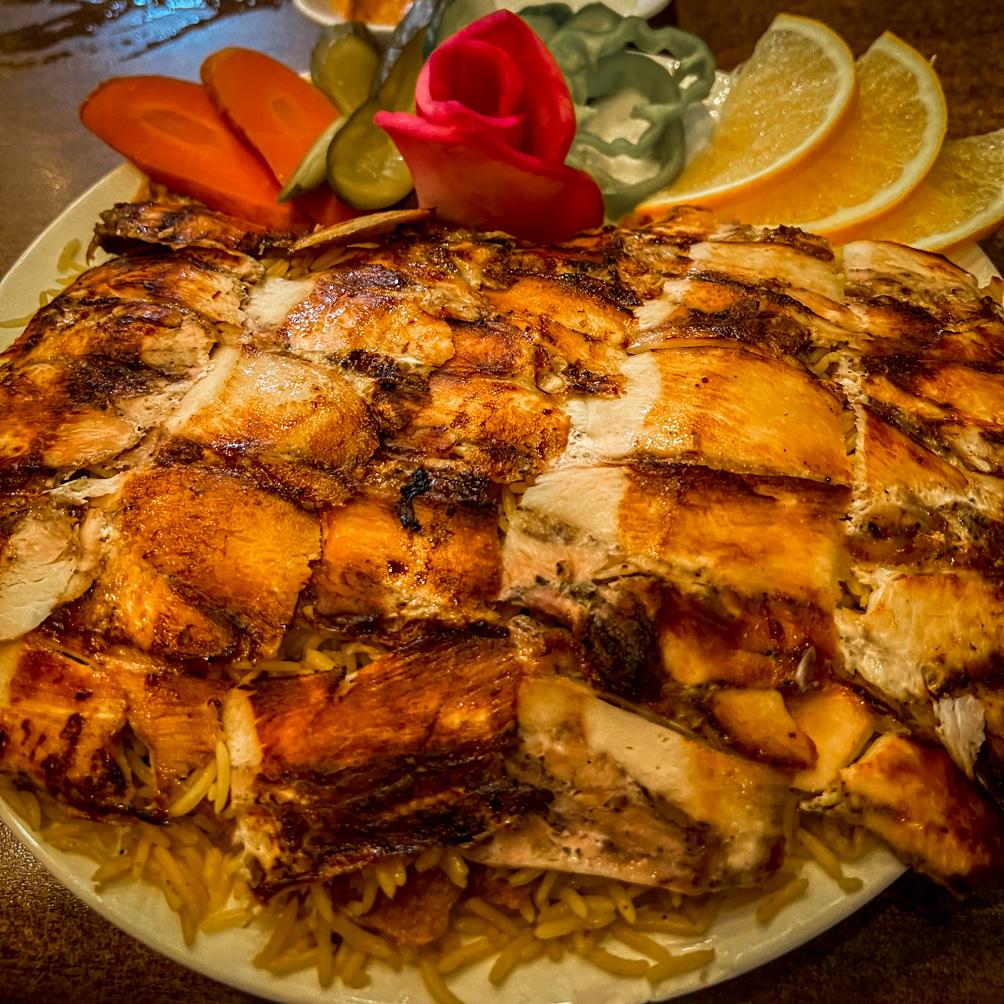
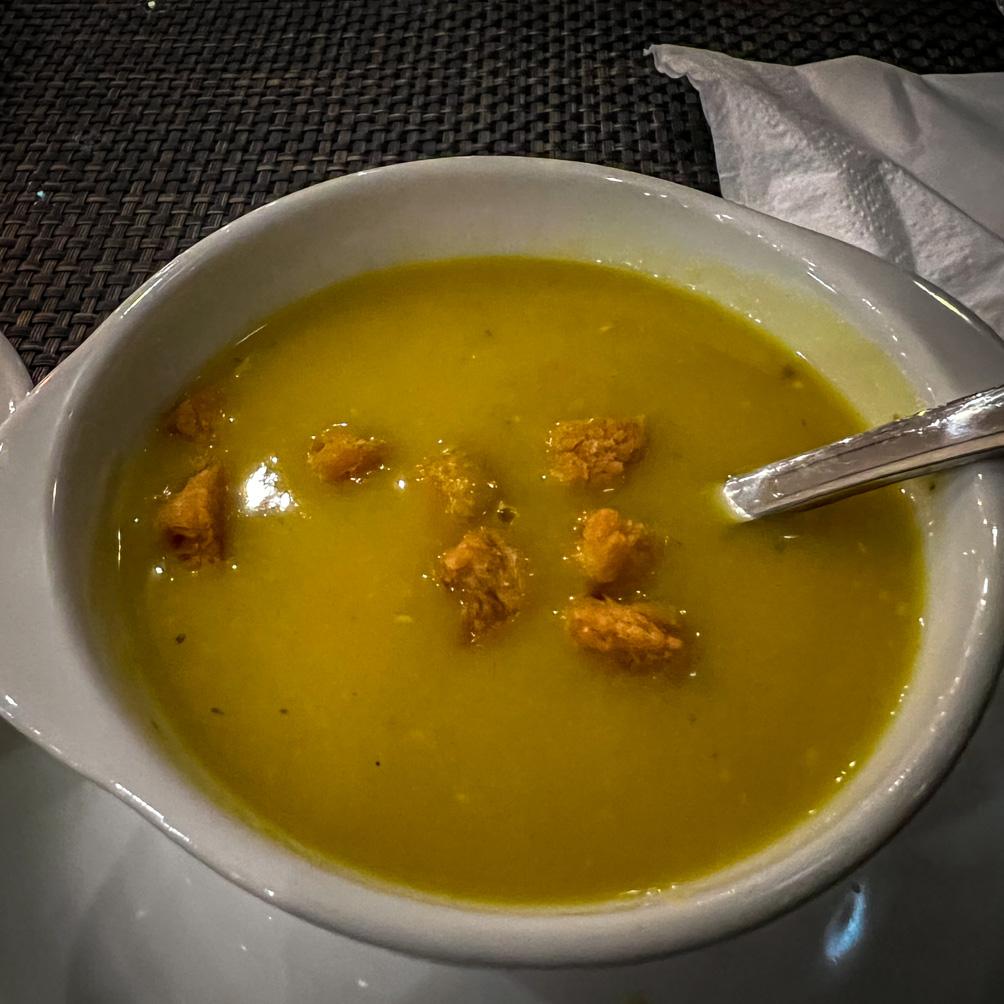
18. Tap Water is not Drinkable
Though tap water is not drinkable, you’ll probably not spend a lot of money on this as bottled water is inexpensive. We usually just carried bottles given at our hotel. Since we hardly ever bought a bottle of water we don’t remember the exact price but it would be somewhere between EGP 2.5 -5 for a 1 L bottle.
19. What to wear
- Egypt is a Muslim country so I suggest carrying more conservative clothing that covers the shoulders, knees, torso and cleavage. Though we noticed tourists wear anything and everything at tourist sites, I’d still urge you to respect the culture of the country and cover up. You can however wear what you like at resorts, especially in beach areas.
- Light and airy clothes as it gets very hot in Egypt during the daytime. I’d suggest cotton blouses, loose-fitted trousers, midi or maxi dresses and skirts, and jumpsuits.
- Since Egypt has a desert climate it also tends to get cold at the night, especially in the winter months of November, December, and January. You could carry a warm jacket if heading to the desert and a light jacket if visiting the northern cities like Cairo, Sharm El Sheikh and Luxor.
- A scarf can serve as a tool to cover up in case you’re wearing short clothes/strappy tops or are even feeling cold.
- We did not notice men in Egypt wear shorts, so men should carry full pants as well except in beach locations.
- Wear comfortable shoes as you’ll be walking a lot. We both wore Neeman’s Relive knits and were pretty happy with them. They’re lightweight, comfy, and look good with everything.
Get detailed tips on what to wear or not wear in Egypt
20. What not to do in Egypt: Know the Customs
Here’s a list of what not to do in Egypt as a traveller. These are things one often overlooks when not having read blog posts like this one. Here are the tips for travelling to Egypt.
- Don’t talk about religion and politics. Egyptians are likely to feel very strongly about certain subjects like Israel, Palestine and Islam, for instance, and these should be treated diplomatically if they ever come up in conversation. Carelessly expressed opinions and open contempt for religion can cause serious offence. If you’re asked your religion please state a religion even if you don’t follow one or believe in God.
- Do not show the sole of your feet to anyone.
- Intimate behaviour in public like kissing and cuddling is a no-no. Even holding hands can be disapproved of, so we really did just it while clicking photos for our blog and only in tourist spots where things are more relaxed.
- If you’re visiting a mosque, you’re expected to be dressed modestly. Men should be covered from below the shoulder to below the knee and women from wrist to ankle. It’s also obligatory to remove shoes or wear overshoes (which you usually get at popular tourist-visited mosques).
- When invited to a home, it’s normal to take your shoes off before entering. It is customary to take a gift: sweet pastries or tea and sugar in rural areas.
- Whether you are right or left-handed, the left hand is used for “unclean” functions, such as putting on shoes or wiping your bum, so it is considered unhygienic to eat with it. You can hold the bread in your left hand to tear off a piece, but don’t ever put food into your mouth with your left hand nor should you put it into the bowl when eating communally.
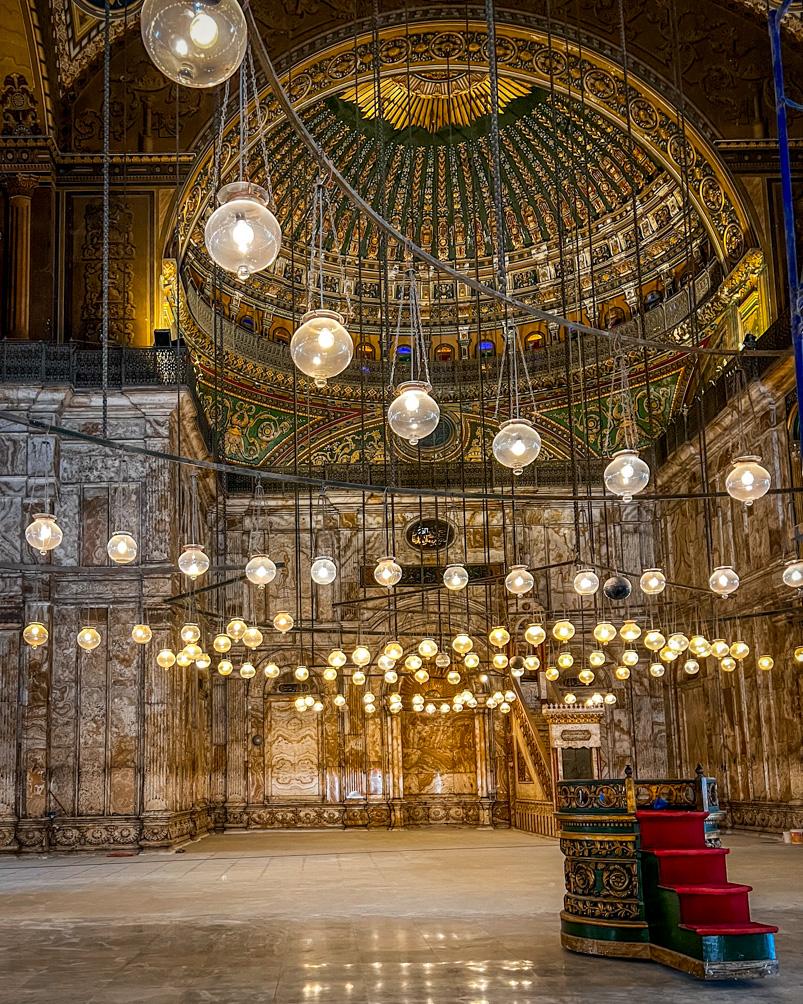
21. Learn some basic words
The language spoken in Egypt is Egyptian Arabic. Some Egyptians can speak English, mainly street traders, who are looking to earn a living off foreign tourists, and some of whom know French as well to appeal to even more foreigners. It is best to know a few Arabic words to converse with them at times, to show you’re making an effort to learn their language and to have some fun learning and speaking it.
- Hello = salaam ‘aleikum
- Thank you = shukran
- No Thank you: La Shukran
- Goodbye: ma’a salaameh
- Let’s Go: Yalla. This is used as an encouragement for anything. Eg. Yalla, eat your food etc.
The others are too tough to pronounce so we couldn’t learn them either but these worked well for us throughout. You’ll find it so interesting to note that some Arabic words are the same as Hindi words. Eg. Hawa (wind), Bas (stop), Yani (means).
Do tell us if you have any questions in the comments below. We are happy to help!
Pin on Pinterest
This ‘Egypt Guide’ has affiliate links that enable us to earn a small commission when you make a purchase, with no extra cost to you. We only recommend products and activities we like and those that might interest you. If you like any suggested product, do buy from the given links.

